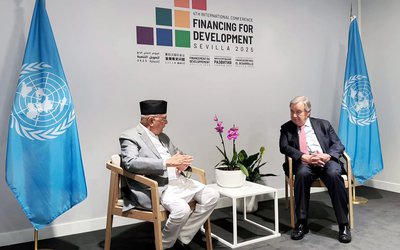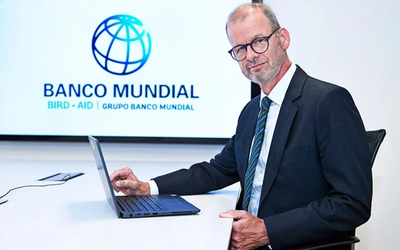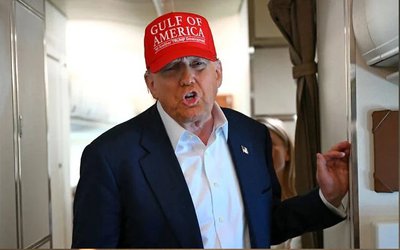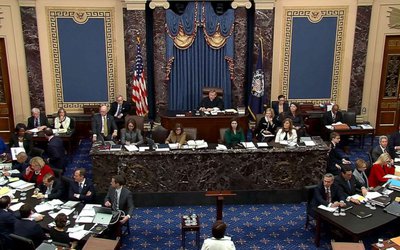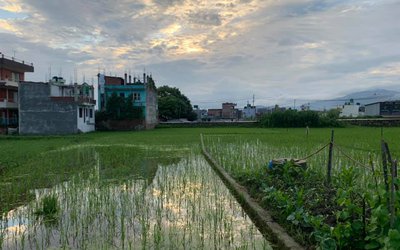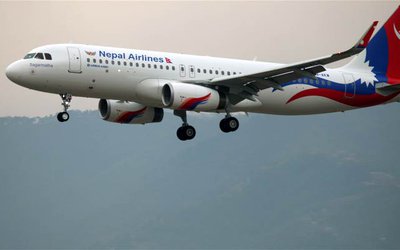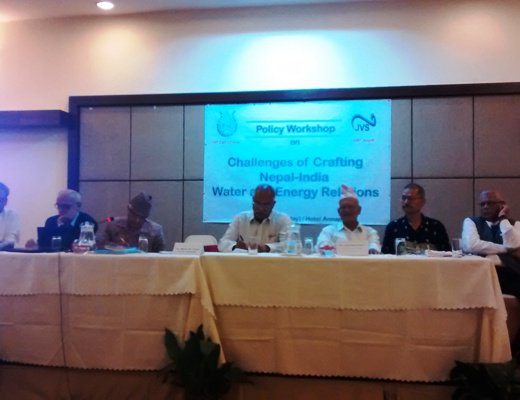
Traditionally, Nepal-India water resources cooperation has passed through actions and reactions in the intellectual circles rather than hard bargains and negotiations at the official tables.
As there is much mistrust at several levels in Nepal and India, all proposals land in controversies. This time around, it was no exception. Soon after former ministers, including Dipak Gyawali, Laxman Ghimire and Thakur Prasad Sharma, raised a question at a consultative meeting hosted by Ministry of Energy in the last week of June, debates over India’s draft proposal for cooperation in the power sector assumed a broader shape in public discourse.
India’s proposal landed at five star hotels for intellectual discussions and now leaders of radical communist parties, including UCPN-Maoist, see this is an opportune time to boost their image by harping on the slogans against the treaty.
Organised by JVS-NePaSaFa, water resource experts from Nepal took a stand in an interaction on Challenges of Crafting Nepal-India Water and Energy Relations at Annapurna Hotel in 18 July 2014.
On India’s Draft Proposal, Nepalese water resources experts have a variety of objections: “The concept of power trade between Nepal and India had started a long time ago as an MOU was signed back in 1996. Furthermore, Nepal had submitted a proposal on Power Trade back in 2010, but this proposal has never been acknowledged. Instead, it has been reported in the media that India recently has sent a new proposal to Nepal Ministry of Energy. It has been 38th Pani Satsang GWP Nepal 2 known through the media that this new proposal has been named as 'Power Development Cooperation Agreement' and also that this new proposal is totally different from the one Nepal submitted in 2010. Ministry of Energy has not made the contents of the so called 'Power Development Cooperation Agreement' public, nor has it shared and discussed it with the political parties, civil society and the experts. The content of such 'Power Development Cooperation Agreement' must be made public and transparently discussed among all stakeholders.”
A note issued jointly by Jalsrot Vikas Sanstha and NePaSaFa said: “If Nepal is to enter into any new agreement, its content and the issues involved in it should be discussed widely with a view to solicit expert opinion and to build consensus among the political parties. For building trust and confidence between India and Nepal on matters of water resources cooperation for mutual benefit, there is a need to set positive and constructive examples by doing projects which could enthuse such trust and confidence. In the present situation it is not advisable for both the countries to jump into any comprehensive agreement on water resources."
Former water resources minister Laxman Prasad Ghimire asked “the government to reject the proposed draft saying that it will end Nepal’s sovereign rights over use of water.”
Knowing that harping populist slogans against India ultimately placed them in power, Nepalese communists joined in the bandwagon to oppose the proposed draft.
“The proposed draft is against Nepal’s popular sovereignty and independence. If the government signed the agreement, we will launch a nationwide agitation,” said UCPN-Maoist leader Leelamani Pokharel......
As in the past, Nepal and India water resources cooperation agenda generated actions and reactions. As Nepalese water resources experts oppose the draft proposal for cooperation in the power sector as something going against Nepal’s sovereignty, Indian embassy has clarified its stand stating that the draft is just in the nature of a framework agreement.
Indian Embassy’s Reaction
Indian Embassy's July 20 press statement says, "the Embassy’s attention has been drawn to several media reports with regard to India’s draft proposal for cooperation in the power sector between India and Nepal. In its five point clarification, Indian Embassy says that the draft is in the nature of a framework agreement that outlines the broad principles and parameters for overall cooperation in the power sector including trading, transmission lines development and grid connectivity and construction of power projects.
“Every power project to be developed will require a separate project implementation agreement and power purchase agreement, terms and conditions of which would need to be agreed,” the statement says."In no way does the draft constrain Nepal’s sovereign right to develop its hydropower potential.”
According to Indian Embassy, power trade in India is under the OGL (Open General License) list. An Electric Power Trade Agreement was signed in 1997. Separately, Bilateral Power Exchange Committee meetings are held from time to time to review power exchange arrangements between India and Nepal.
“The proposal forwarded by India is a draft for discussion and would require bilateral negotiations prior to finalization. Both sides are free to propose amendments or modifications to the draft,” says the press statement.
Nepalese water resource experts hold the view that there is the need of wider consultations to sign any long term or short term treaty or agreement with India on the use of water resources.
Although Nepal and India’s position in the region is dictated by geography which both the countries cannot change, they really care what geography permits them to do.

Keshab Poudel
Poudel is the editor of New Spotlight Magazine.
- FOURTH PROFESSOR Y.N. KHANAL LECTURE: Nepal-China Relations
- Jun 23, 2025
- Colonel JP CROSS: Centenary Birthday
- Jun 23, 2025
- REEEP-GREEN: Empowering Communities with MEP
- Jun 16, 2025
- BEEN: Retrofitted For Green
- May 28, 2025
- GGGI has been promoting green growth in Nepal for a decade: Dr. Malle Fofana
- May 21, 2025

